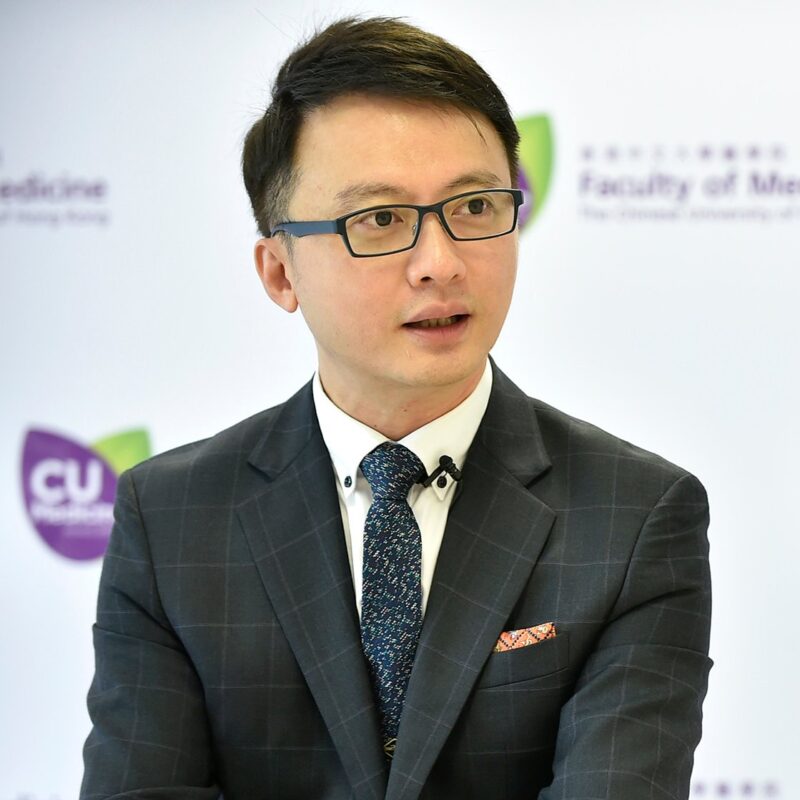Recipient of Sir Edward Youde Memorial Scholarships for Undergraduate Students in 1987/88
尤德爵士紀念基金本科生獎學金1987/88年得獎者
When we were still young, we were often asked about our future dream jobs. One of the most popular answers is becoming a doctor, because doctors enjoy the meaningful vocation to save lives. The recipient of Sir Edward Youde Memorial Scholarship for Undergraduate Students in 1987/88, Dean of the Faculty of Medicine, Chinese University of Hong Kong (CUHK), Prof. Francis Chan chose medicine initially to improve the financial situation of his family. But on his journey of studying medicine, he was inspired by his mentor and endeavored to make a lasting impact to the world.
Prof. Chan’s humble background, particularly in the era of limited resources, played a role in his zeal for striving for excellence and seizing every opportunity. With his high academic achievements in science during secondary school, studying medicine became the sensible path. His decision to study at the medical school at The Chinese University of Hong Kong was mainly based on its enormous potential for career development. Soon after graduation, he arrived at the next crossroads to choose the field of specialty training. Gastroenterology, as opposed to its current scale, was still at a budding stage back then. Inspired by his mentor Prof. Joseph Sung, the then department head and later the President and Vice-Chancellor of CUHK, he pursued gastroenterology to bring to light its possibilities.
A life purpose to make an impact in the world has been his motivation to become the Dean of Medicine at CUHK. However hard a doctor works, there is ultimately a finite number of patients that one can treat. Recognising the limitations of one single individual doctor, Prof. Chan devoted great effort to medical education and training future doctors in a hope to wield further influence to the local healthcare system and to offer quality service to more patients. Yet, increasing the quantity of doctors was not the antidote to all problems in the healthcare system. This realization prompted him to take up the role of Dean of Medicine in 2013, to advocate for policy-making and bring changes on a macroscopic level.
As the Dean of the Faculty of Medicine at CUHK, Prof. Chan wishes to transform medical education, research and clinical services. Inspired by his respected mentors, he understands that medical education is beyond merely passing on medical knowledge. Teachers need to be role models and enlighten students with their actions to become doctors with benevolence, prioritizing patients over themselves at all times. In research, researchers in the Faculty should not hide inside the ivory tower of academia and instead devote themselves to developing medical technologies that bring visible benefits to our society. As for clinical services, doctors should not be confined to taking care of individuals’ health, but to step up to make innovations for our healthcare system with vision.
In addition to training doctors, the faculty also plays a role in the research and implementation of government policies. To relieve the plight of Hong Kong’s over-crowded healthcare system, Prof. Chan suggested following Singapore’s example – increasing the number of public service providers, and adopting a mixed financing system. Singapore’s public hospitals are operated by three healthcare groups, which are government-owned corporations. In terms of financing, they adopt the “S + 3M” model: S for subsidies, the 3Ms represent MediSave, MediShield and MediFund. MediSave is a compulsory national health savings plan; MediShield is a national insurance scheme; MediFund is a government endowment scheme for the indigent with limited resources despite the combination of subsidies, Medisave and MediShield. Also, the pricing of public hospital rooms in Singapore varies. The standard of medical care is the same but more premium rooms cost more with premium services and facilities like TV and air-conditioning, which allow patients to choose based on their needs.
In view of the imbalance of the public and private healthcare sector in Hong Kong, Prof. Chan believes that encouraging partnership between the sectors is the key. He mentioned that the surveillance among hepatitis patients by ultrasound is recommended to be done every 6 months. However, both hardware and software of public hospitals cannot meet the demands. Therefore, making use of the idle resources of private hospitals can be a solution. The establishment of the CUHK Medical Centre also aims to break the existing framework and find a way out for Hong Kong’s healthcare problem.
Prof. Chan is one of the first recipients of the Sir Edward Youde Memorial Scholarship(SEYMF), yet he still has a fresh memory of the selection process. He recalls submitting a self-recommendation letter to share his visions, and being interviewed by prominent medical leaders like Prof. Yuet-Wai Kan and the founding Dean of the Faculty of Medicine, CUHK, Prof. Gerald Choa. He believes that the scholarship aims to broaden the horizons of the awardees, as well as to improve the quality of education in Hong Kong. He is proud to have been recognised by the SEYMF and the scholarship had made it possible for him to travel abroad and realising how big the world is, it takes hard work to keep pace with a changing world.
35 years flew by, Prof. Chan grew from a diligent medical student to the Dean who led a Top 40 medical school in the world. Yet he has never forgotten why he started. He will continue to put the interests of his patients and the wider society as his top priority, and strive to build a better and different world.
小時候,很多人在「我的志願」一文中都會立志成為一名醫生,皆因醫生救急扶危,拯救病人生命,乃是一份別具意義的使命。尤德爵士紀念基金本科生獎學金1987/88年度得獎者,香港中文大學醫學院院長陳家亮教授為了改善家庭的經濟狀況選讀醫科,在學醫的過程中,他受到恩師的感染而立志成為一位致力於關心社會的醫生,繼而使他走上了院長的道路。
陳教授岀身基層,在資源匱乏的年代,很多東西都需要自己爭取。這使到陳教授自小就培養出力爭上游的性格,他在中學時期選修理科,而且成績優異,所以順理成章修讀醫科。考慮到在兩家醫學院的發展空間,陳教授毅然報讀當時創辦只有數年的中文大學醫學院。寒窗苦讀五年,陳教授在畢業後的分岔路上選擇腸胃科專科。當時的腸胃科由他的恩師-沈祖堯教授剛剛接手,陳教授受到沈教授的啟發因而加入當時「人丁單薄」的腸胃科。
在恩師的生命教育下,陳教授更為堅定其匡世濟民的志向。誠然,醫生可以救助病人,但醫生的一雙手能夠幫助的病人有限,為培育更多的醫生令更多病人受惠,陳教授決心回歸母校成為一名老師,從事醫學教育的工作。漸漸地,他發現有些問題不能夠單從增加醫生的數量就能夠解決,而需從更宏觀的層面入手,這驅使他在2013年上任成為醫學院院長,在新崗位上推動醫學教育政策的發展。
作為院長,他希望中文大學醫學院可以在教育,研究和醫療服務三方面帶來改變。教育上,除了知識技術的灌輸,他更體會到生命影響生命的重要,矢志培養出以病人福祉為首的仁醫。在研究上,陳教授期望學院不單純參與一些學術性研究,而是可以推動醫療技術的進步,為社會帶來正面的影響。再者在醫療服務上,他希望醫學院的醫生不但顧及病人的福祉,更具備在醫療體系中創新的願景和能力。
醫學院除了培訓醫生外,亦推動着政策研究和落實。在香港醫療系統的問題上,陳教授認為香港可以在兩方面仿效新加坡的做法,增加公營醫療服務的提供者,同時在融資上設立三級制,讓病人能根據自己的財政能力選擇合適的服務。目前新加坡的公營醫院分別交給三家政府機構營運。在融資方面,他們採用“S+3M”模式:政府補貼 (subsidies),保健儲蓄(MediSave)、終身健保 (MediShield)和保健基金 (MediFund)。保健儲蓄是一項強制性的國家健康儲蓄計劃;終身健保是全民醫療保險;而保健基金則是新加坡政府在以上的方案為幫助貧困市民支付醫療保險費用而建立的捐贈基金。此外,新加坡公立醫院的房價各不相同,不同病房的護理標準是相同的,但設備較好的病房有著較高昂的收費,讓患者可以根據自己的需要進行選擇。
香港公私營醫療失衡是一個公認的問題,在目前環境下促進雙方的合作有望能解決當前問題。陳教授舉例,肝炎病人應該要每半年做一次超音波檢查,但現時公立醫院無論在軟件硬件上無法滿足需求,惟有善用私家醫院的閒置資源才能讓更多病人得到醫療服務。成立中文大學醫院正正希望為香港醫療問題尋找公私營以外的第三條出路。
作為尤德爵士紀念基金本科生獎學金的第一屆得獎者,陳教授仍然對當年的得獎經歷記憶猶新。他回憶當年需要遞交一份自薦信,展述自己的願景,另外還要參與基金會的面試,面試官包括了簡悅威教授和中文大學醫學院創院院長蔡永業教授等醫學界翹楚。他指出獎學金是能擴闊得獎者的視野,促進香港的教育質素,所以能夠獲得基金會的認同使他十分自豪。他亦善用獎學金出國遊歷,認識到世界之大,必需努力才能跟上其他地方的步伐。
渡過了三十五載的光陰,陳教授從挑燈夜讀的學子搖身一變成為一所位列全球前40名的醫學院院長。但他的初衷從來不變,無論是在教學、研究,還是管理上,他無一不是從病人乃至整個社會的福祉著想,希望締造一個更美好、不一樣的世界。

